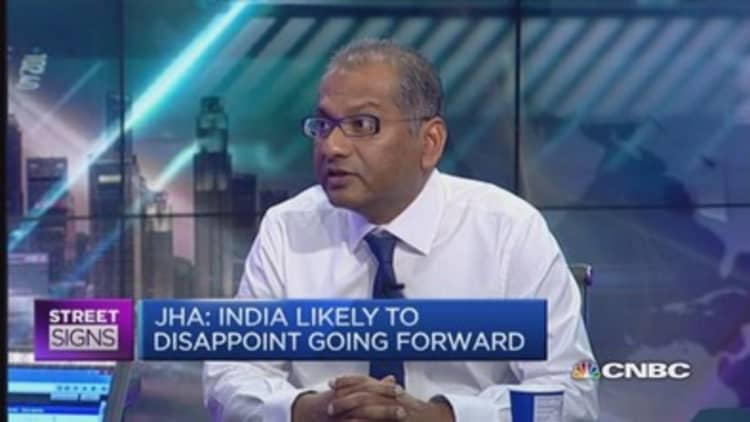The Reserve Bank of India's next policy move will be a "very close call" with economists split over whether the central bank will cut interest rates for the third time in four months when it meets on Tuesday.
Governor Raghuram Rajan has kept markets on their toes this year, with two off-cycle rate cuts in January and March totaling 50 basis points. The benchmark repo rate currently stands at 7.5 percent.
While the RBI prefers front-loading policy easing, recent inflation developments complicate things, said Devika Mehndiratta, senior economist, South Asia & ASEAN at ANZ.
"Upside risks to food inflation (and hence headline inflation) have emerged from unseasonal rains in March – initial reports suggest some potential damage to winter crops i.e. wheat and some vegetables. In our view, this tilts the balance (albeit only slightly) in favor of a temporary pause next week," she wrote in a recent note.
India's consumer price index (CPI) rose to 5.37 percent in February from 5.19 percent in January, owing to a spike in food inflation.

Nevertheless, Mehndiratta noted that "RBIs decision…will likely be a very close call."
Looking forward, if the central bank indeed stands pat, an inter-meeting cut before June is "quite possible," she said.
"Although RBI's forward guidance was ambiguous last month we did get the sense that the bias was to ease a little more to support growth, and to do that sooner rather than later. The space to ease will reduce in coming quarters – not just from an inflation perspective but also because the RBI is unlikely to want to cut rates when the U.S. Fed commences tightening," she said.
Ticking the boxes
In Rajan's last policy statement on March 4, he said further monetary action will be conditioned on several factors: supply side reforms, high-quality fiscal consolidation, the pass through of past rate cuts into lending rates, the monsoon outturn and developments in the international environment.
Read MoreWhy India's reforms are different this time
Many of these conditions have been met, said Taimur Baig, chief economist at Deutsche Bank Research, who believes that the RBI will pull the rate cut trigger on Tuesday. He expects a 25 basis point reduction in the policy rate as well as cash reserve ratio – to 3.75 percent from 4 percent.
"Some notable supply side developments have characterized the past month. Three out the four bills previously held up and pushed through special ordinances have made through both houses of the legislature, becoming laws. These bills cover insurance, coal, and mining & minerals (land acquisition bill remains to be passed)," he said.
On the fiscal consolidation front, there are signs of progress on the government's cash transfer scheme, said Baig.
The ambitious scheme, which was launched in 2013, aims to replace the distribution of subsidized goods with direct cash transfers as a way of curbing leakages.
"The transfer mechanism is already being tried out in certain areas, by paying cooking gas subsidies directly into the bank accounts of 97 million recipients," he said.
While more work is needed to deliver all subsidies through the cash transfer system mechanism, including food and fertilizers – which account for 1.4 percent of gross domestic product – Baig said the government seems committed to move in this direction.
As for the monsoons, Baig says unseasonal rainfall is likely to have pushed up vegetable prices in recent weeks, but with the benign commodity price outlook, overall inflation is likely to remain contained.
Finally, he says current stability in the external environment makes presents an opportune time to adjust monetary policy.
"It is a better strategy in our view to front load the rate cuts, given that the second half of the year could see financial market volatility increase due to potential Fed policy normalization," he said.


